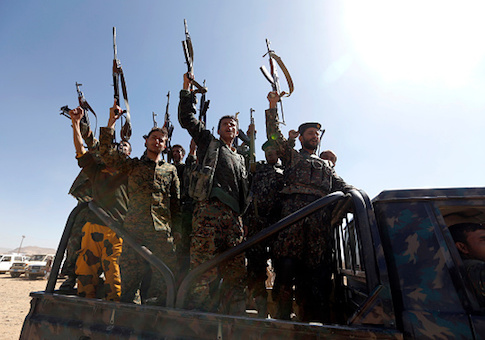The absence of U.S. military assistance to the Sunni Arab coalition fighting the Iranian-backed Houthi militants in Yemen has emboldened the insurgent Houthis over the past two years, according to policy experts.
The Defense Department recently recommended that President Donald Trump commit resources to help forces from Saudi Arabia and the United Arab Emirates counter Iranian influence in Yemen.
The Trump administration has begun weighing greater involvement in Yemen that would include a broader strategy to counter Iran and defeat regional branches of terrorist groups like the Islamic State and al Qaeda, according to several reports. A policy proposal is expected next month.
Sen. Bob Corker (R., Tenn.), who chairs the Senate Foreign Relations Committee, introduced legislation last month that would require the administration to submit to Congress a regional strategy to counter the threat from Iran, including the Islamic Republic's support of Houthi rebels in Yemen.
Corker told the Free Beacon that the administration needs to "explain what they want to do and what it will achieve" if they move forward with deliberations to expand U.S. involvement in the country.
Sen. Tom Cotton (R., Ark.), a Trump ally who has advocated for escalated efforts to roll back Iranian influence in the Middle East, told the Free Beacon in an emailed statement that "Iran isn’t shy about subverting its enemies in the Middle East, and we shouldn’t be either."
Defense Secretary James Mattis recently urged President Trump to lift Obama-era restrictions on U.S. military involvement in Yemen. If approved, the military could back Saudi-led operations against the Houthis more efficiently through surveillance, intelligence sharing, refueling, and operational planning assistance.
In a memo to National Security Adviser H.R. McMaster, Mattis said "limited support" of Saudi-led operations in Yemen would help the United States fight a "common threat." Support could include participating in an Emirati plan to retake the strategic Red Sea port of Hodeida from Houthi rebels.
Iranian strategy in Yemen is aimed at deterring Saudi influence in the region as part of an ongoing battle for regional dominance. Iran is carrying out a similar campaign in Syria, where it supports the Bashar al Assad regime to counter the Saudi-backed opposition and rebel groups.
Michael Rubin, a resident scholar on the Middle East at the American Enterprise Institute, said U.S. inaction has bolstered the Houthis and their Iranian backers. He said this effect was on display when Houthi rebels captured Yemen's capital of Sanaa in 2015.
"After a decade of receiving reward after defiance, Tehran calculates it faces no risk of retaliation for its aggression," Rubin told the Washington Free Beacon. "The Revolutionary Guard has defined the Eastern Mediterranean and the Gulf of Aden as its strategic boundaries and it remains determined to follow up its rhetoric with action."
The American Enterprise Institute issued policy recommendations to the Trump administration in February, advocating for the United States to support the Saudi-led coalition in Yemen. The proposal called on the United States to block Tehran's expansion in the country by interdicting Iranian shipments to Houthi militants by sea and land.
Katherine Zimmerman, the American Enterprise Institute research fellow who authored the report, said the conflict in Yemen has opened up opportunities to Iran.
"Iran has been the primary supplier of arms and supplies to the Houthis, which is a relationship the Iranians didn't have before," Zimmerman said. "It's enabling Iran to build the Houthis toward being a real partner and proxy, and to start using Yemen as leverage elsewhere in the Middle East."
